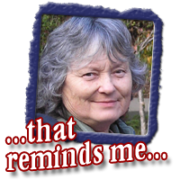The Skirling of the Bodhran
"You know," he said, "bagpipers did not play for the pleasure of one and all. The skirling of the pipes tearing through the fog was said to strike such terror in the hearts of the enemy, as to prepare them instantly for defeat."
There was a bright gleam in his eyes as he spoke. Was he wishing he were a piper? Was he imagining spearing and cudgeling his share of the British enemy? Or did he, in fact, hunt illegally with a bald eagle, one of the few raptors that will eat dead meat?
Once again, I was drawn back into the planning, but the details of group order and timing only dulled my awareness of the real world. My mind was on fierce battles and triumphant bagpipers. Finally the meeting was officially over.
"Do you play the pipes?" I asked Tom.
"No," he said regretfully (I think), "but I play the bodhran. Would you like to see mine? I just finished it last week." I did, of course, so he brought it out and proudly showed me how the shadows in the grain of the deerskin looked like mountain peaks backlit by the sun. Everything about the man spoke of craftsmanship, elegance, and love of beauty. I turned the drum over, expecting to see the braces and handle carved of the finest Oregon myrtlewood, possibly even incised with little Celtic knots here and there. This was the man to do it that way, I thought admiringly.
But what met my softly expectant eyes was as terrifying in its way as the skirl of the bagpipe. From the backside, it looked as though the deerskin didn’t stop at the edge of the drum as they usually do, but continued around to the back, where it was shredded into a few gory-looking strings lashed together to form a handle. It looked as though it were still wet. My mind had been on fierce, brutal, ancient battles and what it saw, whether it was like that or not, was a fresh skin torn, barehanded, off an adversary, wrapped around the precious drum, and tied with bits of sinew and viscera.
All I’d had to drink was a glass of water. I often doze during meetings and, dozing, I often dream. Could I have still been dreaming when I looked at it? I wondered. I called him a couple of days later and asked how many crosspieces he had on the back, three? "No," he said, "there are four. Each one consists of four separate strings of leather so there are sixteen in all. I have my pattern and instructions still, if you’d like to make one," he offered, the kindly lord of the manor again.
This is a gentle town, softened by water, freshened by wind, and fed by people who raise goats and vegetables. There are occasional signs of another side, though, like the barrels all over town last year bearing signs that said, "Leave elk hides here" and people did. No one could tell me why. And, one day at an estate sale, I opened the door to a small bedroom that was empty except for a giant rack of elk antlers stretching from corner to corner.
I can’t wait to hear Tom play his bodhran at the festival jam session. Will his eyes gleam as its soft but relentless sound rises to a terrifying skirl, routing the other jammers and the bystanders? And will anyone else hear what I hear?













